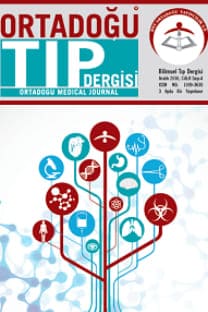Antrasiklin ve taksan rezistant metastatik meme kanseri tedavisinde eribulin mesilat etkinlik ve tolerabilitesi. Tek merkez deneyimi.
metastatik meme kanseri, kemoterapi, eribulin mesilat
Efficacy and tolerability of eribulin mesylate in the treatment of anthracycline and taksan resistance to metastatic breast cancer. Single central experience
metastatic breast cancer, chemotherapy, eribulin mesylate,
___
- 1. Torre LA, Bray F, Siegel RL, Ferlay J, Lortet-Tieulent J, Jemal A. Global cancer statistics, 2012. CA Cancer J Clin 2015; 65: 87–108
- 2. Globocan 2012 istatistikleri. http://globocan.iarc.fr/old/FactSheets/cancers/breast-new.asp
- 3. National Comprehensive Cancer Network . NCCN Clinical Practice Guidelines in Oncology (NCCN Guidelines)®: Breast Cancer Version 1.2014. Fort Washington, PA: National Comprehensive Cancer Network; 2014.
- 4. Cardoso F, Costa A, Senkus E et al. 3rd ESO-ESMO ınternational consensus guidelines for advanced breast cancer (ABC 3). Ann Oncol 2017; 28: 3111
- 5. Baselga J, Cortés J, Kim S-B et al. Pertuzumab plus trastuzumab plus docetaxel for metastatic breast cancer. N Engl J Med 2012; 366: 109–19.
- 6. Geyer CE, Forster J, Lindquist D et al. Lapatinib plus capecitabine for HER2-positive advanced breast cancer. N Engl J Med 2006; 355: 2733–43.
- 7. Slamon DJ, Leyland-Jones B, Shak S et al. Use of chemotherapy plus a monoclonal antibody against HER2 for metastatic breast cancer that overexpresses HER2. N Engl J Med 2001; 344: 783–92.
- 8. Verma S, Miles D, Gianni L et al. Trastuzumab emtansine for HER2-positive advanced breast cancer. N Engl J Med 2012; 367: 1783–91.
- 9. Baselga J, Campone M, Piccart M et al. Everolimus in postmenopausal hormone-receptor-positive advanced breast cancer. N Engl J Med 2012; 366: 520–29.
- 10. Cristofanilli M, Turner NC, Bondarenko I et al. Fulvestrant plus palbociclib versus fulvestrant plus placebo for treatment of hormone-receptor positive, HER2-negative metastatic breast cancer that progressed on previous endocrine therapy (PALOMA-3): final analysis of the multicentre, double-blind, phase 3 randomised controlled trial. Lancet Oncol. 2016; 17: 425-39.
- 11. Finn RS, Crown JP, Lang I et al. The cyclin dependent kinase 4/6 inhibitor palbociclib in combination with letrozole versus letrozole alone as first-line treatment of oestrogen receptor-positive, HER2-negative, advanced breast cancer (PALOMA-1/TRIO-18): a randomised phase 2 study. Lancet Onco. 2015; 16 :25–35.
- 12. Hortobagyi GN, Stemmer SM, Burris HA et al. Ribociclib as First-Line Therapy for HR-Positive, Advanced Breast Cancer. N Engl J Med 2016; 375: 1738-48.
- 13. Twelves C, Jove M, Gombos A, Awada A. Cytotoxic chemotherapy: Still the mainstay of clinical practice for all subtypes metastatic breast cancer. Crit Rev Oncol Hematol 2016; 100: 74–87.
- 14. Jimeno A. Eribulin: rediscovering tubulin as an anticancer target. Clin Cancer Res 2009; 15: 3903–5.
- 15. McBride A, Butler SK. Eribulin mesylate: a novel halichondrin B analogue for the treatment of metastatic breast cancer. Am J Health-Syst Pharm 2012; 69: 745–55.
- 16. Cortes J, O’Shaughnessy J, Loesch D et al. Eribulin monotherapy versus treatment of physician’s choice in patients with metastatic breast cancer (EMBRACE): a phase 3 open-label randomised study. Lancet 2011; 377: 914–23.
- 17. Kaufman PA, Awada A, Twelves C et al. Phase III open-label randomized study of eribulin mesylate versus capecitabine in patients with locally advanced or metastatic breast cancer previously treated with an anthracycline and a taxane. J Clin Oncol 2015; 33: 594–601.
- 18. Blum JL, Jones SE, Buzdar AU, et al. Multicenter phase II study of capecitabine in paclitaxel-refractory metastatic breast cancer. J Clin Oncol 1999; 17: 485–93.
- 19. Reichardt P, von Minckwitz G, Luck HJ et al. Capecitabine: the new standard in metastatic breast cancer failing anthracycline- and taxane-containing chemotherapy? Mature results of a large multicenter phase II trial. Eur J Cancer 2001; 37: 191.
- 20. Fumoleau P, Largillier R, Trillet-Lenoir V et al. Capecitabine (Xeloda) in patients with advanced breast cancer (ABC), previously treated with anthracyclines and taxanes: a large phase II study. Proc Am Soc Clin Oncol 2002; 21: 62.
- 21. Livingston RB, Ellis GK, Gralow JR et al. Dose-intensive vinorelbine with concurrent granulocyte colony-stimulating factor support in paclitaxel-refractory metastatic breast cancer. J Clin Oncol 1997; 15: 1395–400.
- 22. Zelek L, Barthier S, Delford JP et al. Weekly vinorelbine is an effective palliative regimen after failure with anthracyclines and taxanes in metastatic breast cancer carcinoma. Cancer 2001; 92: 2267–72.
- 23. Chaudhry S, Abdel-Rahman HA, Patil R et al. Prospective phase II study of weekly cisplatin-gemcitabine in refractory metastatic breast cancer (RM-BC). Proc Am Soc Clin Oncol 2000; 19: 111.
- 24. Valenza R, Leonardi V, Gebbia V, Agostara B. Gemcitabine and vinorelbine in pretreated advanced breast cancer: a pilot study. Ann Oncol 2000; 11: 495–96.
- Yayın Aralığı: 4
- Başlangıç: 2009
- Yayıncı: MEDİTAGEM Ltd. Şti.
Ağız kanserleri ve diş hekimlerinin rolü
Hamed DEVECİ, Dilek Aynur UĞAR ÇANKAL
Karın radyografisinin akut apandisit tanısındaki yeri: önemli midir?
Devlet hizmet yükümlülüğü süresinde spontan pnömotorakslara yaklaşım
Hüseyin YILDIRAN, Tuba ŞAHİNOĞLU
Katılma nöbeti ve demir eksikliği anemisinin önemi
Aktif ve inaktif Behçet hastalığında serum hepsidin düzeyleri
Okan DİKKER, Sembol YILDIRMAK, Mustafa ŞAHİN, Murat USTA, Müberra VARDAR, Eren VURGUN, Yüksel ÇİÇEK, Mustafa DURMUŞCAN, Zeynep ALTUN, Fehmi BARAN
Demet KOKANALI, Meryem KURU PEKCAN, Yasemin TAŞÇI
Moellerella wisconsensis’e bağlı olarak gelişen periton diyalizi ile ilişkili peritonit olgusu*
Duygu Çerçioğlu, Süleyman Karaköse, Ayşe Zeynep Bal, Esra Kaya Kılıç, Mehtap Alev, Salih Cesur, Çiğdem Ataman Hatipoğlu, Sami Kınıklı
Behçet hastalarında pulmoner arter sertliğinin değerlendirilmesi
Hayriye ŞAHİNLİ, Mustafa Gökhan VURAL, Göksal KESKİN
